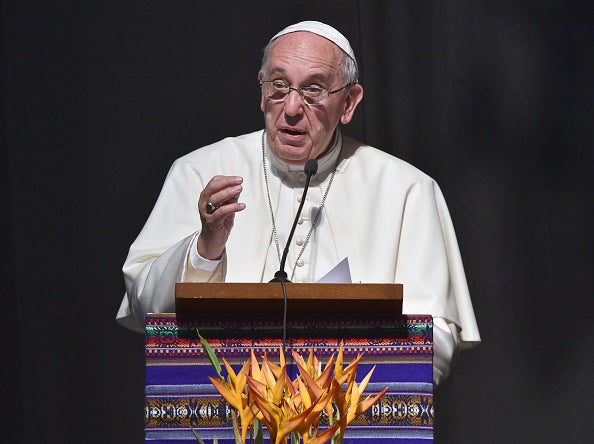Pope Francis apologises for Catholic crimes against indigenous peoples during the colonisation of the Americas
'Grave sins were committed against the native peoples of America in the name of God'

On his first papal visit to his native Latin America, Pope Francis issued an historic apology to the native peoples of the Americas for sins committed by the Catholic Church during the conquest of the continents.
At a social justice summit in Bolivia, at which many indigenous groups and the country's first-ever indigenous president Evo Morales were in attendance, the first-ever Latin American pope "humbly" asked for forgiveness.
In his speech, Francis said that many Latin American Catholic leaders have previously addressed the "grave sins committed against the native peoples of America in the name of God".
He also recalled that, during a visit to the Dominican Republic in 1992, Pope John Paul II had apologised for the "pain and suffering" over the hundreds of years since the Church arrived at American shores.
But Francis went further.
He said: "I humbly ask forgiveness, not only for the offences of the church herself, but also for crimes committed against the native peoples during the so-called conquest of America."
Going off-script, he continued: "I also want for us to remember the thousands and thousands of priests who strongly opposed the logic of the sword with the power of the cross. There was sin, and it was plentiful.
"But we never apologised, so I now ask for forgiveness. But where there was sin, and there was plenty of sin, there was also an abundant grace increased by the men who defended indigenous peoples."
The indigenous groups burst into applause following his comments, with one leader, Adolfo Chavez, saying: "We accept the apologies. What more can we expect from a man like Pope Francis?"
"It's time to turn the page and pitch in to start anew. We indigenous were never lesser beings."
Six million flock to see Pope in Philippines
Show all 10The speech was made at a particularly sensitive moment for Church relations with Native Americans, with Francis' controversial plans to canonise the 18th Spanish priest Junipero Serra, who set up missions across California.
Where Native American activists claim the priest brutally converted indigenous people to Catholicism, the Vatican says he actually defended them against violent colonists.
The affectionate response Francis received was in stark contrast to the furore his predecessor Benedict XVI sparked when he visited the continent in 2007. He said the indigenous people of Latin America had been "silently longing" to become Christians before they were forcefully converted and displaced.
Mexican Bishop Raul Vera, who said the church was passive in the enslavement of the continent by the Spanish, said Francis' apology was especially moving given the setting and circumstances.
MORE POPE:
Pope receives unusual gift from Bolivian President
Evolution and Big Bang theory are real, says Pope
9 awesome things Pope Francis did in 2014
It was the longest and most significant speech of Francis' week-long South American pilgrimage. In keeping with his values, Francis hit out against an unjust global economic system and called for a "fitting distribution" of the Earth's resources.
Following his climate change encyclical last month, the Pope criticised the "cowardice" of the world's governments for failing to protect to Earth, saying that while it "is being pillaged, laid waste and harmed with impunity [...] one international summit after another takes place without any significant result."
Additional reporting by Associated Press
Subscribe to Independent Premium to bookmark this article
Want to bookmark your favourite articles and stories to read or reference later? Start your Independent Premium subscription today.

Join our commenting forum
Join thought-provoking conversations, follow other Independent readers and see their replies